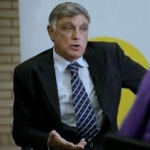Ambassador Chaim Koren
 As a native of the Carmel, raised in Haifa, I began my studies in the University of Haifa in 1976, right after I finished my service in the IDF. The lessons taught at the department of History of the Middle East (those who coincide with Political Science) raised curiosity and seemed challenging.
As a native of the Carmel, raised in Haifa, I began my studies in the University of Haifa in 1976, right after I finished my service in the IDF. The lessons taught at the department of History of the Middle East (those who coincide with Political Science) raised curiosity and seemed challenging.
At this point, I did not master the Arabic language well and my knowledge of the Middle East area was very basic. Most of the courses in the department were very interesting and some served as a magnet to examining the historical processes the area had experienced, and to reach deep insights. The university, relatively young at the time, was wise to put researches who, besides standing out in their profession, were good teachers and with their caring and involved personal attention, got many students interested in the field. Some of my outstanding teachers were the Professors Gabi Varburg, Gadi Gilber, David Kushner, Butrus Abu-Manneh, Yossi Nevo (z”l) and others.
Finishing my BA, I took the Foreign Ministry cadets course. When I got in, I moved to Jerusalem. At the end of the cadets’ course, I won the privilege to be included in the first class of the master’s degree studies in the Hebrew University’s Rothchild Foundation (History of Islamic States Studies (and Ministry of Foreign Affair’s program. My thesis (“The Wallad Jabaar and their Land”) was advised by Prof. Gabi Varburg from the History of the Middle East Department at the University of Haifa.
Right after I completed my studies, I went overseas for a mission abroad (as a second secretary in Israel’s Embassy in Nepal) and from there I moved to serve as Israel's consul in Alexandria, Egypt. From here thereon, I’ve been in many diverse and fascinating positions in the Ministry of Foreign Affairs, in Israel and abroad. Most of them dealt with the Middle East, directly and indirectly. For example, I founded the department of Arabic Communication in the 1990s and managed it, I served as a manager of the research department which deals with Egypt, North Africa, Sudan and Turkey in the Center of Political Research (Mamad). My deputy was Ayelet Yehiav, who is also a graduate of our department in Haifa (Ayelet served in Cairo during her diplomatic career).
While serving as the general console’s deputy in Chicago, I served as a member of the Center of Political Research at the University of Chicago and taught a course on modern Sudan. I took part in many conferences discussing the Middle East, some held in the Middle East itself, in Jordan, Egypt, Morocco, Tunisia, Mauritania, Qataar, and the Emirates. While working in Israel and abroad I completed my doctorate was which advised by Prof. R. S. O'Fahey: "Local Archives in Dar Fur 1720 – 1916: A Source for Legal, Political and Religious Aspects of the Islamic Community of Western Sudan.”
That is how Sudan became my main academic specialization. After that, I served as the first Israeli Ambassador in South Sudan (With whom I established the diplomatic relations.) My experience and knowledge in the Sudanese field was of great help in setting up, managing and establishing the relations. From South Sudan, I moved right into the position of Israel’s Ambassador in Egypt. My service began right after Mohamed Morsi’s regime and during Abdel Fattah el-Sisi’s presidency. I had the opportunity to serve in Cairo and I have experienced the changes in the region and the bilateral relations with Israel.
Knowledge of the language, familiarity with South Sudan and Egypt and the Middle East in general – was a significant tool in my work. The nuances, the ability to communicate with people of different backgrounds, knowledge of separate dialectics of the language and the possibility to share the cultural experience heart to heart with single people and different crowds opened many doors before me and enriched my inner world.
Much of the accumulated layers of knowledge, enjoyment of the treasures of Arab culture and insights on the society – can be credited to what has been imparted to me in our department. In my view, we should strive to increase our knowledge of the way of life in our region not only in learning, but by experiencing it too. If the graduates of the department will get to the Ministry of Foreign Affairs (or other workplaces which deal with the subject), it will be possible for them to combine challenges in a fascinating job and experience an interesting life.


